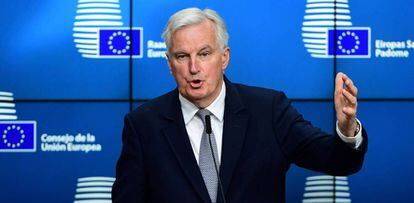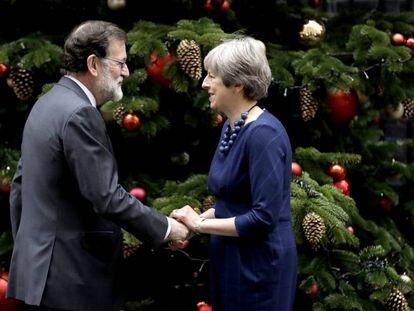EU’s Brexit negotiator seeks to calm concerns on Madrid visit
Michel Barnier meets with government representatives and business figures and offers support to Spain over Gibraltar question


European Union special negotiator Michel Barnier arrived in Madrid on Tuesday for a jam-packed schedule of meetings all aimed at calming concerns over the impact of the United Kingdom’s exit from the union – a process commonly known as Brexit. Barnier met with the Spanish government and with business leaders, sharing two key messages: the process has been complicated but it should be fast; and the United Kingdom will be worse off than the EU after it leaves, but both will be weakened. On the thorny issue of Gibraltar, the contested UK overseas territory located in southern Spain, Barnier expressed his support for the position of the Spanish government.
Without the UK, the EU will make up just 14.5% of global GDP
Madrid is one stop on Barnier’s tour of European capital cities – an atypical tour that looks to update European leaders on the Brexit negotiations. Barnier – a former French minister with 20 years of experience in parliament, and who was previously agriculture minister and European commissioner for the domestic market – has been tasked the onerous job of negotiating a Brexit resolution in the name of the 27 EU member countries – a role he is carrying out with unusual transparency compared to the typical secrecy of these deals. Barnier regularly reports back to government heads in Brussels and has also paid personal visits to different countries and parliaments.
On his third meeting with the Spanish Parliament’s European Affairs Commission, Barnier lamented that Brexit would affect the EU’s standing in the global economy. GDP from the European Union, including the UK, makes up 16.9% of the global total. Without the UK, this figure will drop to 14.5%. The EU negotiator showed a chart prepared by former UK Prime Minister David Cameron illustrating how the five European nations are falling behind with each passing decade and will soon be left out of the top 10 world economies. The chart predicts that by 2020 only Germany will remain on the list. The EU, however, will remain in the top four rankings – with or without Brexit – and according to Barnier, play a key role in maintaining global order.
Spain has the right to veto any decision regarding Gibraltar in the transition period between and post-Brexit
During his presentation, Barnier argued that despite the complexity of the Brexit negotiations – which seek to undo 750 agreements that have been forged over 44 years of alliance in the space of just 24 months – and the tight schedule (two years from March 2017, according to the letter delivered by UK Prime Minister Theresa May), the process is going well – particularly for the EU. The negotiator avoided commenting on divisive national issues – not even when Republic Left of Catalonia (ERC) senator Laura Castel complained about Spanish police and judicial abuses during the Catalan independence referendum, nor when he was asked what was his position on a hypothetical repeat Brexit referendum or if Brexit was scrapped completely.
Barnier appeared in Spain’s Congress after meeting with Deputy Prime Minister Soraya Sáenz de Santamaría, the special government team on Brexit, and Foreign Minister Alfonso Dastis. He later met with business leaders and announced he would hold another meeting with the unions. Barnier said he hoped the hands-on approach would reduce as much as possible “the anguish and uncertainty” caused by Brexit, especially for the 4.5 million people who will be most affected: the 3.3 million European citizens living in the UK, and the 1.2 million British citizens living in Europe, the majority of them in Spain.
58.7% of Spanish workers in Gibraltar will be negatively affected by Brexit
The EU negotiator said talks will resume on January 29 and will address the conditions of the transition period before the UK’s complete exit from the EU, a phase that will span from March 20, 2019 to December 31, 2020.
Many members of parliament asked Barnier how the negotiations will affect Spain’s relationship with Gibraltar. Barnier said the Rock will leave the EU at the same time as the UK and reaffirmed that any negotiations concerning the territory – particularly the rights of the more than 10,000 Spaniards who cross the border to work each day – must be approved by the Spanish and UK government.
In March last year, the EU offered Spain the right to veto any decision regarding Gibraltar in the transition period between and post-Brexit. In a recent study coordinated by the European Committee of the Regions, Andalusia, Spain’s border region with Gibraltar, indicated that 58.7% of Spanish workers in Gibraltar will be negatively affected by Brexit. The region also noted that British tourism contributes 1.2% of its GDP.
English version by Melissa Kitson.












































